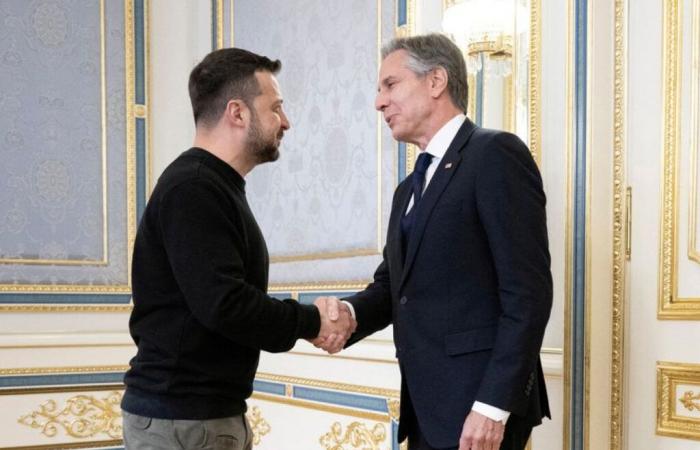US Secretary of State Blinken greets Ukrainian leader Zelensky in Kyiv
par Simon Lewis
Outgoing American Secretary of State Antony Blinken is expected in Brussels this Tuesday for talks with officials from the European Union (EU) and NATO, who fear seeing the United States abandon Ukraine in the face of Russia with the return of Donald Trump to the White House.
During this first trip abroad since Donald Trump's victory in the American presidential election on November 5, Antony Blinken will discuss with his interlocutors “support for Ukraine in its defense against Russian aggression”, declared the State Department, without any details on the exact content of the message that will be transmitted by the outgoing Democratic administration.
Donald Trump has sharply criticized the United States' payment of billions of dollars in military aid to Ukraine since the start of Russia's large-scale invasion of that country in February 2022, raising fears of a U-turn from Washington when he returns to the White House, with a Senate and certainly a House of Representatives also in Republican hands.
Joe Biden's administration has indicated that it will endeavor to deliver the aid already promised to Kyiv before the inauguration of the future president on January 20, while Ukraine has not been able to stop the advance for several weeks. Russian troops in the east of its territory.
“We are working hard to leave Ukraine in the strongest possible position, both by increasing aid between now and the end of this administration and by coordinating with our partners around the world to ensure that they are ready to fill any gap,” said a US official who requested anonymity.
This concerns not only the European allies of the United States with whom Antony Blinken will speak in Brussels but also other countries such as South Korea, which could be brought to play an important role in the strengthening of the alliance between Russia and North Korea, the official added.
Ukraine says around 11,000 North Korean troops are now engaged in combat in Russia's Kursk region, where its army broke through in August.
THE ISSUE OF DEFENSE BUDGETS BACK TO FOREFRONT
“The most important work they can undertake (…) is fundamentally to transfer as much of this as possible to the Europeans,” thinks Anne-Marie Slaughter, director of the New America think tank and former diplomat at the Department of State.
European countries have prepared for a second term of Donald Trump, four years after the end of the first, and they are keen to publicly display their desire to work with him, she adds.
“(Blinken) should be able to do things behind the scenes, discreetly,” continues Anne-Marie Slaughter, as well as “reminding Europeans that they retain many friends in the United States, even if this government is going to take a very different approach “.
The return of Donald Trump to the White House should also bring to the forefront the question of the defense budgets of NATO members. Most of them now devote more than 2% of their GDP to it, the required threshold, but the future American president has warned that he will require a commitment of 3% from them.
For years, Donald Trump has expressed his annoyance with members of the transatlantic alliance for failing to meet their military spending targets. He warned during the election campaign that he would not only refuse to come to the aid of “failing” countries in terms of financing but that he would also encourage the Russians to “do what they want to them”.
The future president also promised that he would end the war in Ukraine within 24 hours, without saying how.
He spoke with Ukrainian President Volodimir Zelensky the day after his election. According to a source familiar with this conversation, he also had a telephone conversation with Vladimir Putin during which he urged the Russian president not to worsen the situation in Ukraine. The Kremlin has denied that such a meeting took place.
The Biden administration no longer has any cards to play to try to change the situation favorably for Ukraine, judges Daniel Fried, a former American diplomat now a member of the Atlantic Council think tank.
It could try with its allies to impose new sanctions against Russia or toughen the implementation of existing measures, but any such initiative could easily be wiped out by a Trump administration, he adds.
“If Biden's teams try to corner them or score points, Trump's teams might just brush that aside,” says Daniel Fried.
(Written by Simon Lewis, with Andrew Gray in Brussels, French version Bertrand Boucey, edited by Blandine Hénault)




